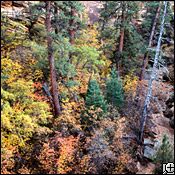
There are far fewer species of trees in temperate forests than in tropical forests. Broad-leafed trees, such as oak, birch, chestnut, and maple, make up most of the trees in the southerly reaches. Farther north, colder temperatures encourage the growth of coniferous trees, such as pine, redwood, hemlock, and cedar.
Seasonal contrasts mark this biome; summers are generally warm, and winters are cold, often below freezing, forcing some mammals to hibernate or migrate. Rainfall is often more evenly distributed throughout the year, and in some regions, such as northeastern North America and southeastern Australia, the amount is high enough for temperate rain forests to grow.
Although temperate forests are home to a variety of ground-dwelling mammals, including red foxes, musk deer, rabbits, and wild boars, some forest dwellers have adopted an arboreal lifestyle. Gray squirrels, for instance, are physically well suited to scampering along branches, gripping the bark with their sharp claws, and jumping from tree to tree, using their tail as a counterbalance. Unlike most tree-climbing mammals, such as bears, which climb down back-end first, these squirrels descend head-first.
North American porcupines, which live in both the temperate and northern coniferous forests of North America, are also tree climbers, with rough, nonskid pads on the soles of their feet and a tail equipped with modified spines on the underside. Conifers, such as the eastern hemlock, are their food of choice and their passage is often noted by the appearance of shiny rings girdling the trunk high up, where they have eaten the bark away. Other inveterate climbers include the gray fox (Urocyon cinereoargenteus), which relies on the extended rotatory ability of its fore legs to help it shinny up trees, while pushing with its hind feet like an arboreal bear. An omnivore, the gray fox generally climbs trees to reach fruit or to escape.